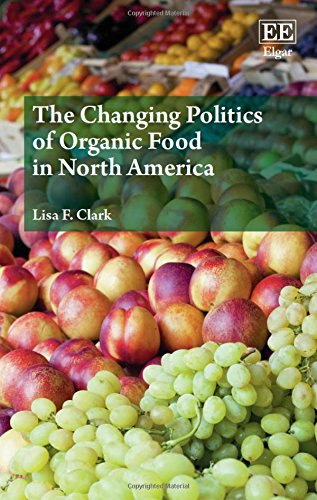
Media
Organic food politics
CTV Saskatoon, February 6, 2016Television
interviewed about organic foods in Canada - are they worth it?

The Laundry List - Saskatoon's feminist talk radio show
CFCR community radioRadio/Podcast
URL: https://www.facebook.com/LaundryListRadio
listen live on Mondays @ 6PM (CST) on 90.5FM CFCR or online at www.cfcr.ca/onair we podcast too! http://laundrylist.podomatic.com/
CBC Radio 1 Blue Sky, November 5, 2015Radio/Podcast
interviewed about the politics of organic foods
CBC Radio 1, December 17, 2015Radio/Podcast
interviewed about food security in Ethiopia
NewsTalk770, April 5, 2016Radio/Podcast
discussed recent cases of food fraud
The Big Business of Organic Food
On Campus News, November 11, 2016Print
URL: https://news.usask.ca/articles/general/2016/the-big-business-of-organic-food.php
interviewee
Saskatchewan author tracks rise of organic food movement
OrganicBiz, April 4, 2016Print
URL: http://organicbiz.ca/saskatchewan-author-tracks-rise-organic-food-movement/
Saskatchewan author tracks rise of organic food movement
Saskatchewan researchers examine ways to end malnutrition in Ethiopia
CBC Saskatoon, December 15, 2015Online
Saskatchewan researchers examine ways to end malnutrition in Ethiopia; Pulse crops might be the answer
'Lisa Clark's scholarly account of the development of the organic movement in the United States and Canada beautifully explains the decades-long transition from understanding organic production as inextricably tied to healthy soils, communities, and social justice ('process-based') to views of organics as meeting certain standards for marketing purposes (product-based). Read this book and you will care deeply about the difference in these views as well as understand current debates about the future of organics.'- Marion Nestle, New York University, US and author of What to Eat'In this fascinating book, Lisa F. Clark presents the history of organic food in North America, from its early roots as a marginal farming activity to its well-established position in today's food market. She analyses political institutions, social movements and corporate actors in how they deal with the delicate question of balancing the search for increasing the market for organic food while maintaining broad organic values. Without offering simple answers to this question, Clark offers important insights into the different approaches to this question. This book is very interesting and highly relevant for anyone interested in organic food in North America and beyond.'- Peter Oosterveer, Wageningen University, the Netherlands'In a globalized food system that struggles to connect the environmental, social, economic and governance dimensions of sustainability, this book provides precious insights. It documents the birth, development and 'mid-age crisis' of the organic movement in North America. The historic lack of clarity between organic principles and practices, and especially the insertion of the organic sector into the global trade regime, have left behind the process-related goal of organic production. Seventy years of lessons, ebbs and flows of a movement searching for an authentic future. A must read for all those interested in sustainable agriculture, institutional challenges faced by value-based movements and visioning organic agriculture pathways.'- Nadia El-Hage Scialabba, Food and Agriculture Organization of the United Nations, ItalyThe Changing Politics of Organic Food in North America explores the political dynamics of the remarkable transition of organic food from a 'fringe fad' in the 1960s to a multi-billion dollar industry in the 2000s. Taking a multidisciplinary, institutionalist approach that integrates social movement theory, public policy analysis and value chain analysis, it tells the story of how the organic movement responded to the social, economic and political changes brought on by the rise of industrial agriculture in the twentieth century.This book examines how the changing constellation of actors, institutions and ideas involved in the politics of organic food influenced the evolving goals and principles of the organic movement, including the muting of social and political organic principles in formal policy and the eclipse of the 'process-based' definition of organic by the 'product-based' definition. It discusses the integration of organic food into the globalized food system and how food and agriculture movements have responded to the forces of industrialization and globalization, as well as critically analyzing the vulnerability of social movements that do not address market interactions in their mandates.This timely and impactful book is a theoretical and empirical resource for researchers and advanced students working on organic food, agriculture, comparative public policy analysis, trade policy, institutionalism and social movements, as well as those involved in making food and agriculture policy.
The current status of DNA barcoding technology for species identification in fish value chains
Published by Food Policy
May 4, 2015
Abstract DNA barcoding technology is championed as superior to current species identification methods because of its expert-authenticated verification system and accuracy. Despite the general consensus that DNA barcoding is a valuable innovation for authenticating food products vulnerable to substitution, this paper explores some of the challenges to the formal adoption of barcoding into multi-level policy. It discusses the scope of the problem of mislabelling and substitution in fish value chains, how barcoding is currently used in the public and private sectors, and some recommendations for further implementation. It also includes a discussion of the status of DNA barcoding in the United States and in Canada’s food safety surveillance systems to combat fraud, mislabelling and species substitution in fish value chains.
URL: http://www.sciencedirect.com/science/article/pii/S0306919215000585
Maintaining Scientific Integrity in Canadian regulatory protocols: Using Strategic Thinking to Facilitate Innovation and Enhance Engagement Policy Brief No. 10
Published by Genome Canada
April 3, 2015
This brief takes a systems approach to explore how Canadian regulation protocols for Genetically Modified (GM) crops and foods can maintain scientific integrity while encouraging effective engagement by stakeholder groups. Discussed are the challenges faced by the regulatory system for GM crops and foods in the context of broader science and technology policy initiatives in Canada.
URL: http://www.genomecanada.ca/sites/genomecanada/themes/genomecanada/media/Genome_GPS_10_English.pdf
Mediating the GM Foods Debate: Lessons from the Enduring Conflict Framework
Published by Journal of Food Law and Policy
December 28, 2015
co-authored with Michaela J. Keet and Dr. Camille D. Ryan
URL: http://heinonline.org/HOL/LandingPage?handle=hein.journals/jfool11&div=15&id=&page=
Innovations in Food Assistance Strategies and Therapeutic Food Supply Chains
Published by Emerald Group Publishing
December 31, 2015
co-authored with Jill E. Hobbs This chapter discusses how changes in institutional objectives for international food assistance have influenced the organization of supply chains for innovative therapeutic foods designed to address problems of malnutrition and undernutrition. It draws upon insights from donor and international organization reports, policy documents, and academic publications to reveal the structure, goals, and objectives of international organizations involved in food assistance strategies. Explores how innovations in Ready-to-Use Therapeutic Foods and Ready-to-Use Supplementary Foods fit into food assistance strategies and broader humanitarian goals. This chapter raises important considerations to factor into the design and execution of international food assistance strategies using LRP/P3 modes of organization. It contributes to an understanding of the challenges of organizing international food assistance strategies that include socioeconomic goals of sustainability and nutrition objectives.
URL: http://www.emeraldinsight.com/doi/abs/10.1108/S1574-871520150000015016
Expanding markets and evolving regulations for Canadian certified organic foods
Published by Canadian Food Insights
April 11, 2016
This review explores the evolving market and regulatory framework for certified organic foods in Canada. It begins by briefly tracing the development of early organic standards in Canada. It then looks at the negotiations around establishing the Canadian organic standards that led to ratification in 2009. The review also examines current policy initiatives in the form of strengthened trade policy and evolving food safety regulations in Canada and how they relate to the growing certified organic food sector in Canada.
Framing the Uncertainty of Risk: Models of Governance for GM Foods
Published by Science and Public Policy
May 13, 2013
The interpretation of risk in governance frameworks for genetically modified (GM) foods is an important component of their design and function. This paper develops the concept of a risk frame to better understand how perceptions of risk, uncertainty, and authority over evidence are considered in governance frameworks for GM foods. It develops a typology of risk frames: the proof of harm, precautious and precaution through experience risk frames. The ‘precaution through experience’ risk frame is an emergent concept offering possible avenues beyond current regulatory standoffs by incorporating both scientific and socio-economic perspectives of risk in deepened deliberative settings. The paper uncovers how varying interpretations of uncertainty and acceptable levels of risk associated with innovative technologies influence the development of public policy within regulatory frameworks for biotechnology.
Direct Democracy, State Governments and the Re-energized GMO Debate: Implications of California's Proposition 37
Published by AgBioForum
June 11, 2013
co-authored with Camille D. Ryan and William A. Kerr
Democratic Legitimacy, Risk Governance and GM food
Published by Social Philosophy Today
June 3, 2014
co-authored with Neil A. Hibbert The use of Genetic Modification (GM) in food is the subject of deep political disagreement. Much of the disagreement involves different perceptions of the kinds of risks posed by pursuing GM food, and how these are to be tolerated and regulated. As a result, a primary institutional site of GM food politics is regulatory agencies tasked with risk assessment and regulation. Locating GM food politics in administrative areas of governance regimes produces unique challenges of democratic legitimacy, conventionally secured through legislative channels. In particular, debate over the ends of a society’s policy on GM food inevitably continues in these institutional locations, despite conventional instrumental understandings of administrative legitimacy resting on effective application of ‘ends-means’ norms. This paper assesses the two major regulatory frameworks currently applied to GM food—the ‘precautious’ (associated with European jurisdictions) and ‘proof of harm’ (associated with North American jurisdictions) approaches—and presents their respective limits in securing the procedural and substantive dimensions of the legitimacy of administrative deference in democratic societies. On the basis of these criticisms, a synthesized and emergent approach—‘experiential precaution’—is presented as having the resources to deepen the legitimacy of risk governance institutions in the case of GM food. It is characterized by deepened participatory practices of negotiated rule-making and inclusion of further substantive requirements in approval criteria.
Bioproduct Approval Regulation: An Analysis of Front-line Governance Complexity
Published by AgBioForum
May 7, 2013
co-authored with Peter W.B. Phillips The behaviors and seemingly disconnected exchanges between actors operating within subcomponents of hierarchical decision-making systems can contribute to unanticipated broader-system effects. The concept of complexity is a useful way of better understanding the influential nature of these connections on decision-making outcomes. This article presents the findings on subsystem complexity in bioeconomy governance from research undertaken by members of the VALGEN Regulation and Governance team. It demonstrates how applying Social Networking Analysis (SNA) and kurtosis analysis to regulatory frameworks can be used to uncover complexity within multilevel governance. SNA reveals how informal interactions in the decision-making process can impact the regulatory process. Kurtosis analysis shows how inputs into regulatory frameworks are not evenly reflected in the outputs. The article discusses the results of these methodologies applied to approvals in Canada of plants with novel traits and argues that appropriate qualitative and quantitative data sources are important to understanding complexity within the governance structures of the bioeconomy.
Biography
Lisa Clark holds a PhD in political science from Simon Fraser University. Currently, she is a research associate with the Department of Agricultural and Resource Economics at the University of Saskatchewan. She is examining the political and socioeconomic dimensions of innovative ready-to-use foods. Her research interests include food security, food quality standards and labelling, food safety regulations, and technology & innovation in the food system. Clark's work has appeared in Food Policy, Science and Public Policy, Social Philosophy Today and most recently, Food Law & Policy. Her new book, The Changing Politics of Organic Food in North America is available in hardback and e-book from Edward Elgar Publishing. Clark is also a co-host on The Laundry List - feminist talk radio show broadcasting from Saskatoon.
Past Talks
Panel on Women in Organic Agriculture
Organic Connections conference
Regina, SK, November 4, 2016
Politics and organic food
SaskOrganics AGM
Kenaston, SK, April 1, 2016
Consuming information: Packaging Facts & Processing Perceptions
Saskatchewan Institute of Agrologists
North Battleford, SK, March 6, 2014

